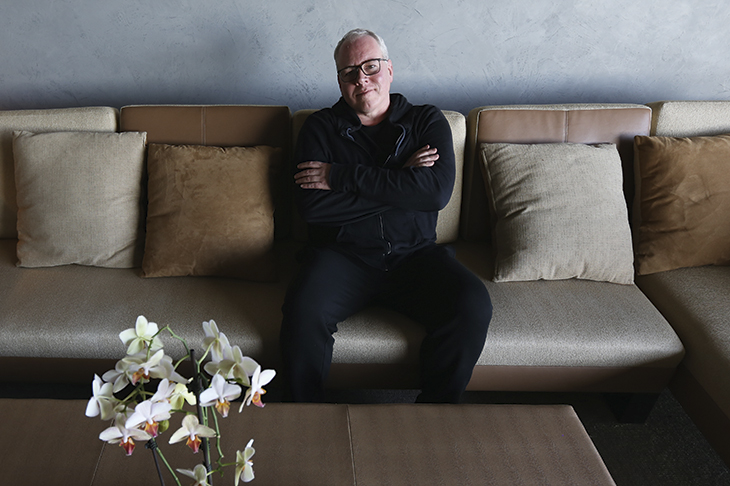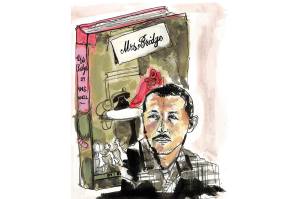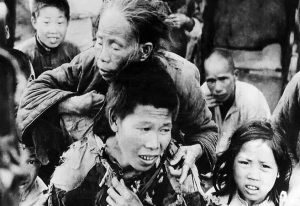‘I grew up in LA where we all thought fame was a joke,’ says Bret Easton Ellis. ‘My class was filled with people from Laura Dern to the girls in Little House on the Prairie. And it always seemed a bit of a joke. I never really imagined that was on the cards for me. And I really haven’t done a lot of the things that you’re supposed to do to stay famous.
‘I haven’t published anything in 10 years. I haven’t tried to write that novel that’s going to give critical acclaim or a prize or two — which I’ve never won. And I seem to be continually controversial and rub people the wrong way. And this has been for 35 years now and I can’t tell you why: I don’t know. I mean the big joke is: cancel me. Come on, cancel me if you can’t stand it so much.’
Yet here he is in The Spectator’s offices to record our books podcast: a famous writer. Also one who gets more famous the less he writes and the more people try to ‘cancel’ him. There’s a good bit of the latter going on at the moment. The meandering autobiographical essays in his new book, White, have had some corkingly savage reviews on both sides of the Atlantic, particularly in response to passages where he inveighs against millennial culture and liberal hysteria about the Trump administration.
Ellis often seems to revel in poking wasps’ nests. People have crossed the road to baseball-bat this book, I say. Was that what you were expecting? ‘No. Not at all. I’ve never written a more controversial book than this since American Psycho and I am stunned. I saw this as not a political book, and yet everyone takes it as a political book filled with rhetoric and political opinion.’
It’s the first time Ellis has published nonfiction. What made him decide to? ‘My agent told me it sells better.’ ‘Are you short of cash?’ ‘Uh — taxes in California…’ He alludes to a stillborn novel in the introduction, and he says ‘fiction had been leaving me for a long time’. He’s done a lot of screenwriting, with patchy success, but ‘I didn’t know what the novel necessarily was doing. It didn’t really resemble what it had been doing in the analog era, where it was a source of news […] That was the kind of novel that I grew up with. The novel was a means of communicating not only aesthetics but a sense of a world that we don’t know anything about. It’s very hard to do now.’ Hence, perhaps, Ellis’s embrace of podcasts (much of the material in White started life as monologues for podcasts) and making salty remarks on Twitter.
One such, notoriously, was a tequila-fueled tweetstorm a few years back about David Foster Wallace — ‘the most tedious, overrated, tortured, pretentious writer of my generation’. He says now that Wallace was ‘brilliant’, but: ‘I don’t believe that David was a fiction writer. I believe that he was a journalist. He was a nonfiction writer and I think ultimately the idea of being a novelist kind of killed, kind of destroyed him.’
Their difference goes to the nub of the question of the role of fiction. Wallace wrote, notoriously, that ‘irony is ruining our culture’ — rejecting as a dead-end the pervading irony of (among other things) Ellis’s then-lionized style. Ellis half-concedes the point, but says: ‘I don’t know what he replaced [irony] with, and I didn’t like what he replaced it with, whatever that might have been. It seemed like a gesture to me, like so much of David Foster Wallace seemed to me to be a gesture.’
The sections of White that have got Ellis in trouble are the least interesting passages in a pretty interesting book. Jibes against ‘snowflakes’, ‘safe spaces’, ‘virtue-signaling’ and so on are nothing you can’t read in any number of outlets. The bulk of the book is about his well-off, neglected SoCal childhood, the effects of his early celebrity (Less Than Zero made him famous before he’d left college, and American Psycho made him famous worldwide), wry memoir fragments about hanging out with Kanye West, snorting coke with Basquiat or being overpaid by Tina Brown to profile Judd Nelson, and a lot of rumination on music and the movies.
And the anti-snowflake stuff is the public continuation of a private conversation: ‘My boyfriend is a passionately progressive liberal millennial who has gotten Trumped for three years, who has completely fallen apart because this man is president.’ He sees his boyfriend as representative. But Ellis is far from a Trump fan. The Donald was a big satiric presence in American Psycho. He just thinks well-heeled liberals have lost all sense of proportion about him.
What Ellis identifies as one of the central themes of the book, though, is at a slant from politics: the conflict between aesthetics and ideology. In a passage on his hero-worship of Joan Didion as a young man, he says that what marked Didion out, more important than the crosspatch and eccentric political stances she took, was ‘style’. As he sees it, cultural gatekeepers now reward ideological correctness ahead of aesthetic flair.
But can you draw the line between aesthetics and ideology as simplistically as that? Aren’t aesthetics ideological? ‘Yes,’ he says. ‘That is true as well. But I lean more towards finding a meaning in something’s style rather than in its messaging. This generation is on the surface: the message is the aesthetic. It’s very different from how I grew up, where the style was the meaning of something.’
Ellis calls the notion of cultural appropriation ‘a terrible thing — a terrible thing for artists. It’s absolutely anti-art’. But in White he complains at length that the Oscar-garlanded movie Moonlight is a failure as art — in large part because its director is straight: that it’s a straight man’s idea of a gay experience. Isn’t that essentially a complaint about cultural appropriation? ‘No. It doesn’t mean you can’t make it. Look, I am sure there are straight men who might have directed that with a little bit more heat — think of the sex scenes in Brokeback Mountain — but [Moonlight’s director Barry] Jenkins as a straight dude is not interested in that kind of distraction. I don’t believe that gay people should only direct gay films at all. It suggests a society that really doesn’t care about art any more and that only cares about ideology. When ideology runs the day, I don’t know what kind of art that leads to: it leads to a kind of studio-approved, intellectually woke art which is usually the worst art you can possibly find. It’s bizarre that all these critics say: “We need more movies about, uh, transgender Latina handicapped people at Sundance — really these are the movies that we need.” And I’m saying: you’re goddamn crazy. You know that’s not true. You know you want a new Scorsese film. You know you want Saturday Night Fever. You know you want Taxi Driver. Those are the movies that excite you. Those are the big spectacle movies that you all grew up on.’
The nostalgia that suffuses White maps on to the distinction Ellis has made between the period of American cultural pomp and swagger he calls ‘Empire’ and the more anxious ‘post-Empire’ period that the country now occupies. And most of the distinction he makes is, as he says, about culture rather than about politics. He’s not so much about Making America Great Again as about Making Hollywood Great Again.
I haven’t met a literary novelist who bangs on about film as much as Ellis, or who writes about it as feelingly and as persuasively; from the 1970s horror flicks he grew up on to the hypnotizing erotic blankness of Richard Gere in American Gigolo. ‘All my friends’ parents worked in Hollywood […] I was coming of age in the 1970s which is the Golden Age of American moviemaking […] Movies were what we aspired to; movies are what we wanted to make. Movies were the grand art form.’
Also, he’s profoundly interested in actors. Doesn’t he, at least a bit, subscribe to the Trey Parker/Matt Stone view that actors really just aren’t interesting? ‘Well they very much aren’t to a degree — and there’s something about that uninteresting[ness] that I find fascinating. It’s kind of like the cast of characters from a lot of my novels. I find something completely compelling about it. How does an actor move through his day? How does he interact with other people when he’s not acting?’
He says he finds the actor’s combination of professional likability — ‘actors have to be likable in order to be cast’ — and self-loathing ‘attractive’. ‘And it has spilled out into the culture in that we are all actors on social media to a degree: I’m not saying, you know, in such a heavy-handed, overly literal way — but there is a performative aspect that has been enhanced in our lives.’
Ellis is an amiable character — neither the cantankerous old git nor the icy nihilist of caricature. But he seems a little melancholy under the offhandedness. There’s a poignant aside in White where he says the happiest he has ever been in his life was the summer of 1991. Did he know that at the time? ‘I did.’ He fixes on that summer because it was the moment the storm over American Psycho — death threats; denunciations in the New York Times and on CNN; a general assumption his career was over, that he was ‘canceled’ — broke with the book’s publication.
‘It’s very hard to explain to people now,’ he says. ‘It’s like a balloon deflating because people finally read the book. The book was finally released. Everyone else was talking about some fantasy they had about the book and it all stopped… There was this huge sense of relief. And I didn’t care any more. I thought, I’m never going to go through something like that again. I’m never going to be this kind of pariah ever again. I’ve come close but never as much as I was during the American Psycho controversy. And that summer was quite free and joyous. I felt that I had become an adult.’
A lot of his public persona is not caring what anyone thinks, but it sounds like he cared very much then. ‘I don’t care how I’m portrayed. I minded how the book was being portrayed.’ And yet it took Ellis a long time to come out as gay — ‘I really didn’t feel it was really anybody’s business […] I also didn’t want during that time my books to be put into the gay ghetto of the gay section’ — and even longer to come out as Patrick Bateman. He initially said he modeled Bateman on his father, but ‘20 years after the book was published’ started to talk about how it was ‘based on me and my youthful unhappiness and my inability — my inability to become me — and my resistance to becoming a man in a society whose values I found abhorrent’.
He now says of American Psycho that, far from the amoral book naive readers saw it as, ‘it is an extremely moralistic book. It’s also quite earnest, and I see that earnestness throughout the novel if I pick it up, and it drives me a little bit crazy’. But that book ‘is going to be on my tombstone. I get it. I get it.’
This article was originally published in The Spectator magazine. Now listen to Bret Easton Ellis and Sam Leith on the Books podcast:


















